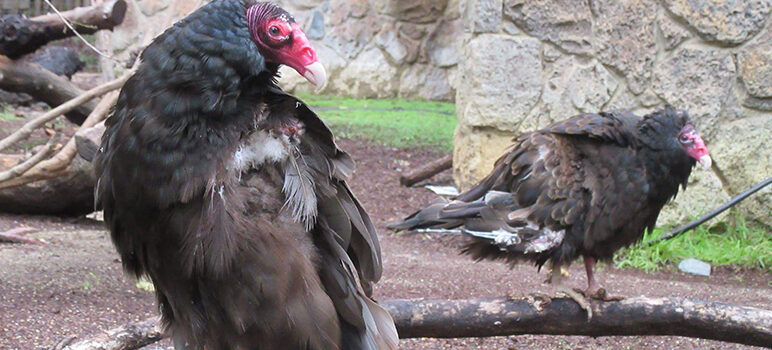It’s been a strange summer for Happy Hollow Park & Zoo.
First came the pandemic, which deprived the animals of visitors.
Then came the unseasonable heatwave, in which the zoo’s furry, scaled or feathered wards found some relief by chomping on ice cubes and hovering around cooling fans.
Now, the smoke.
Fire-fueled particulates have led to a record-breaking stretch of unhealthy air days that’s forced the more sensitive critters at San Jose’s Happy Hollow to stay inside.
“With the poor air quality, we’re challenged to make sure that they’re all healthy,” Happy Hollow Zoo Manager Kevin Hertell says today in a phone call. “Just like with humans, we don’t want them to over-exert themselves right now.”
Every day, zoo staff monitors the Air Quality Index (AQI) to determine which of the facility’s 150 animals to keep outside and which to shelter.
Among the most vulnerable to the ashy air are the older animals and those with an acute sense of smell. That includes a pair of once-wild turkey vultures named Friendly and Jackson and a handful of red-and-blue eclectus parrots.
“We’re just really careful,” Hertell explains.
Enrichment training—designed to keep the animals’ minds sharp and bodies nimble—has for some animals been limited to cognitive instead of physical exercises. If the AQI surpasses 120, Hertell says, he’ll bring more of the birds indoors and probably stop some of the exhaust fans from pulling in outside air.
“It depends on the air quality day to day,” he says.
Misti, a capuchin monkey who’s pushing 40—an advanced age for her kind—has hunkered down inside to protect her aging lungs, Hertell says. A decade-old capybara, who’s also considered elderly for his species, has an opening in his enclosure that lets him choose whether to stay in or out for the time being.
While the hazy skies can be disorienting and throw off one’s sense of time, Hertell says Happy Hollow’s animals seem to be doing just fine on their rigid schedule of training, feeding and veterinary checkups.
“For the most part, all the animals are doing well,” he tells San Jose Inside. “We’re just taking the necessary precautions and making sure they’re mentally challenged since they can’t do as much physical activity.”
Over the course of a four-decade career as zookeeper, Hertell says he’s helped animals under his watch weather hurricanes in Florida, floods in Missouri and big freezes in Arizona. The prolonged span of smoke-and-ash pollution plaguing the Bay area presents a new challenge, but one that he says the animals should endure just fine.
“One benefit of being a small facility is that our zookeepers are really knowledgeable about each individual animal,” he says. “So, all they know their animals and know their behaviors and know what to look for if they need help.”

